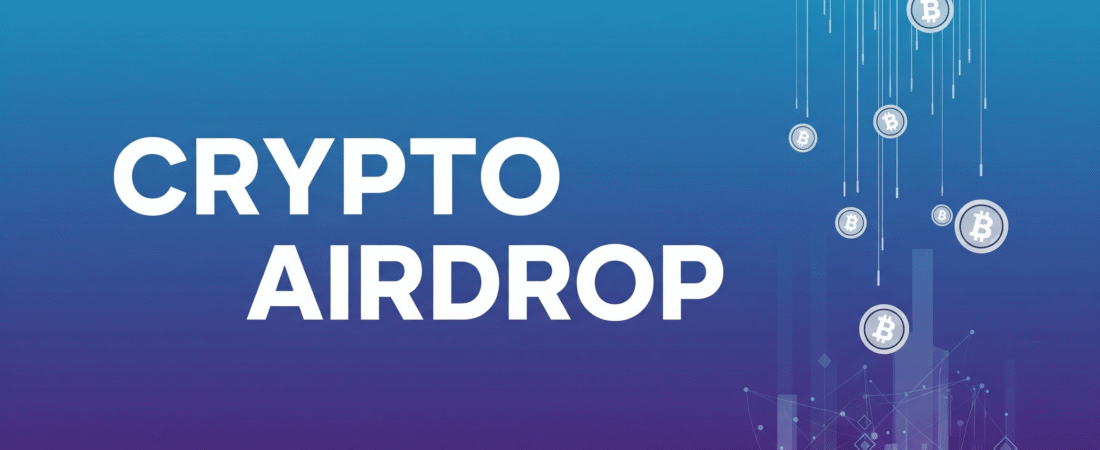In the world of crypto, there’s a saying that goes, “If it’s free, it’s probably bait.” That’s not always true, especially in the case of crypto airdrops. These giveaways are real—but so are the traps that come with them.
If you’re wondering how to get free crypto without falling into a scam, this guide walks you through everything—from what airdrops really are, to how you can safely get involved without losing your sanity (or your funds).

So, What Exactly Is a Crypto Airdrop?
Imagine a startup trying to promote their app. Instead of handing out flyers or paying for ads, they just drop a bit of their currency into people’s wallets. That’s basically what a crypto airdrop is.
It’s a marketing strategy used by blockchain projects to spread awareness and reward early supporters. You don’t have to buy anything. Sometimes, just being in the right place at the right time is enough.
Other times, you’re asked to do things like:
-
Join their Telegram group
-
Follow them on Twitter/X
-
Fill a basic form
It’s usually pretty straightforward. But here’s the kicker: the amount you receive is often small. Like, “grab-a-coffee” small. So, if you think airdrops will make you a millionaire overnight, you might want to adjust expectations.
How to Actually Get Free Crypto from Airdrops
Let’s break it down with no fluff:
-
Have a Wallet Ready
Use something non-custodial like MetaMask or Trust Wallet. Avoid keeping everything on exchanges. -
Know Where to Look
Sites like Airdrops.io, CoinMarketCap Airdrops, and even Twitter threads can give you leads on current or upcoming drops. -
Filter the Noise
Not every airdrop is worth your time. Focus on projects that already have some community or roadmap credibility. -
Engage with the Project
Some of the more generous airdrops go to users who actively use or test the platform. If you like the idea of passive rewards, try “testnet” campaigns where you use the platform in its early stages.
Spotting the Real from the Fake
Scammers know the word “airdrop” gets attention. They’ll copy logos, create fake websites, and even DM you pretending to be official team members. So, how do you tell what’s legit?
-
Check the Domain
Official sites usually end in .com or .org. Avoid links with weird endings or multiple dashes. -
No One Needs Your Keys
The golden rule: no legit airdrop needs your seed phrase or private key. If anyone asks for it, close the tab. -
Look for Smart Activity, Not Hype
If a project is only hyped on social media but has zero working product or whitepaper, it’s probably not worth your time. -
Be Suspicious of Time Pressure
“Hurry, ends in 5 minutes!” is usually a fake-out. Real projects don’t push you to rush.
Red Flags: How Airdrop Scams Work

Let’s be blunt: scammers are getting creative. Here are a few tricks they often use:
-
Fake “Claim” Links
They send you a link to “claim” your airdrop, but instead you end up signing a transaction that drains your wallet. -
Lookalike Accounts
Sometimes, scammers copy popular influencers or companies. Always verify through pinned posts or official sources. -
Malicious Smart Contracts
Some airdrops ask you to interact with a contract that looks harmless but gives them access to your funds. If you’re not sure what you’re signing—don’t sign. -
Requests for Gas Fees
Asking for ETH or BNB to “cover network costs” is a common scam. Real airdrops usually handle that or clearly state what you need up front.
Airdrops Won’t Make You Rich—And That’s Okay
Here’s the truth many YouTube videos won’t tell you: most crypto airdrops give very small amounts of tokens. In some cases, it’s just pennies.
But here’s the silver lining—it’s still free money. Over time, small wins stack up. And occasionally, you hit gold (like early adopters of Uniswap, Arbitrum, or Optimism did).
Just don’t expect magic. Treat airdrops like cashback or small loyalty rewards, not a replacement for a job.
Final Thoughts: Stay Smart, Stay Skeptical
The crypto space is exciting, unpredictable, and sometimes a little chaotic. Airdrops are a fun way to dip your toes in, explore new projects, and earn a little extra along the way. But only if you play it safe.
Keep your private keys private. Double-check URLs. Don’t rush into anything just because it has “free” written on it. And always, always use common sense—because in crypto, it pays more than hype ever will.

